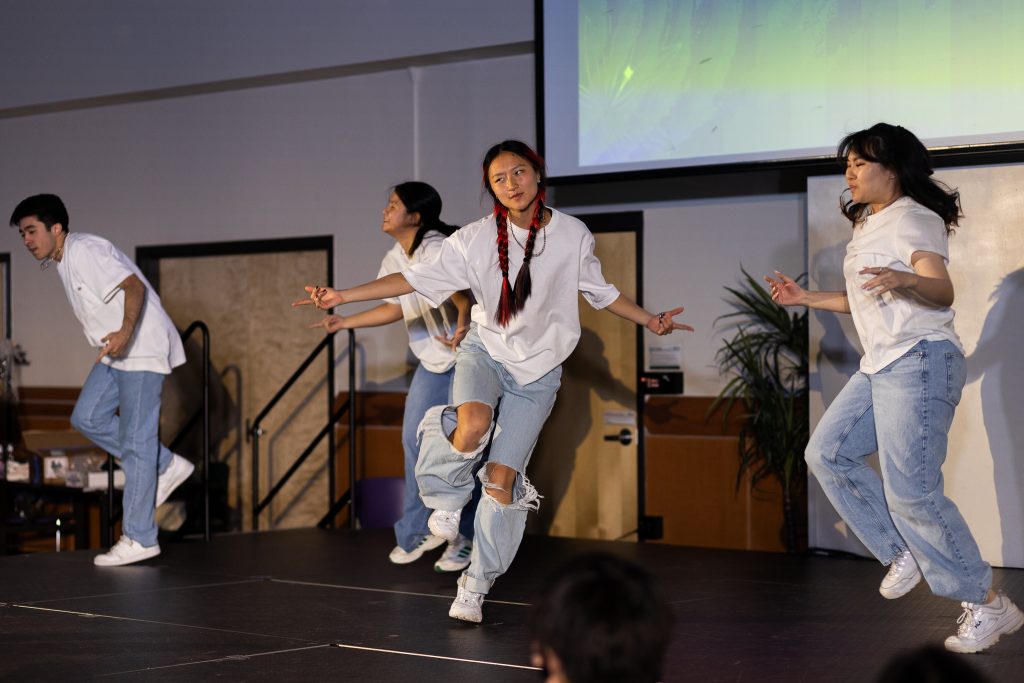This past Sunday, the Binghamton University Japanese Association (BUJA) brought the University community together with a red string of fate for Japan Night.
The night featured a variety of cultural dances, vocal performances and interactive games, all organized around the theme of tashō no en, a proverb that conveys the role of fate in shaping the course of our lives. The proverb calls upon the ideas of reincarnation and karma, in which fate continues to affect our interactions in the present.
Japan Night also featured a skit that was produced by multimedia chairs Matthew Chow, a sophomore majoring in cinema, and Eric Chacon, a freshman majoring in business administration. The skit told the story of the romance between two college students played by Yuki Watanabe, event coordinator for BUJA and a freshman majoring in biology, and Sophia Fogiel, art director for BUJA and a freshman majoring in biomedical engineering, as their strings of fate repeatedly become entangled.
Shinnosuke Nishio, cultural chair of BUJA and a sophomore majoring in philosophy, politics and law, elaborated on the theme for this annual event.
“Every [organization] has their own banquet, and for us, it’s Japan Night,” Nishio said. “For this year, the theme is tashō no en. It’s a Japanese word and it means ‘there is nothing that is coincidence in life’ — everything is decided. So when you meet a stranger in a road … that’s not a coincidence, that’s already decided.”
BUJA opened the night with an E-Board video and the first part of the skit, facilitated by emcees Bian Suzuki-Wolf, treasurer of BUJA and a senior majoring in computer science, and Maddisyn Campagnone, publicity chair for BUJA and a senior majoring in integrative neuroscience.
The skit was followed by a kimono fashion show, featuring volunteers who showcased traditional Japanese clothing in a runway style. Continuous installments of the skit punctuated the cultural performances, which included an E-Board girls dance and boys dance, performances of Japanese music by solo vocalists and soran, a traditional Japanese fisherman’s dance.
Leo Morifuji, cultural chair of BUJA and a junior majoring in political science, was responsible for teaching BUJA members how to perform the fisherman’s dance along with the other cultural chairs. Morifuji described the cultural significance behind the fisherman’s dance.
“The fisherman’s dance originated from centuries ago, and the one we do is called the nanchu soran,” Morifuji said. “Ours originated in Hokkaido, which is the very top area of Japan. Every single move that we do, it’s like fishermen. When we do the dokkoisho, which is the iconic move, it’s like you’re pulling in fishnets. And when you’re throwing stuff, ‘soran, soran,’ it’s like you’re throwing away a bucket of fish.”
The soran dance was followed by performances throughout the night, including two subgroups of MODA X, one of BU’s dance organizations. First Paradox took the stage with their synchronized K-pop choreography, followed by MODA, who graced the stage later in the night with hip-hop performance to songs such as “DNA” by Kendrick Lamar. Unkai Daiko, a recently formed musical organization at BU, brought drumming Japanese to the stage as well.
Xin Lei Lin, dancer in MODA and a junior majoring in biology, described the experience of performing at Japan Night.
“It was super rewarding,” Lin said. “The president of BUJA is my super close friend, so being able to perform at her event made me feel super proud of her. [It] really [demonstrated] for me that I was able to help her and see her create such a great event.”
The preparation for Japan night included weekly meetings among event coordinators, collaborating with the rest of the E-Board, and meetings every weekend to practice dancing and create the decorations, according to Kelcie Alba, event coordinator for BUJA and a junior double-majoring in Japanese studies and political science. The decor was created by BUJA’s art directors, who created and designed the large paper cranes and painted backdrops that adorned the Mandela Room. Alba explained that the event planning also included coordinating with the staff of the Mandela Room and Kampai Japanese Steakhouse, the caterer for Japan Night.
Jessica Kwok, president of BUJA and a junior majoring in biology, thanked the E-Board for their tireless efforts at the end of the night. Kwok also thanked the members of the Asian community at BU who turned out for the event and the BUJA alumni and parents, who made the trip to Binghamton for Japan Night.
Alba conveyed the significance of Japan Night to BUJA and the broader Binghamton community.
“More than anything, BUJA exists as a club in order to spread Japanese culture to our local community, and Japan Night is an extension of this,” Alba wrote in an email. “Japan Night is the culmination of our E-Board’s hard work and our genuine desire to share the aspects of Japanese culture that are both well-known and niche. We wish to make Japanese culture easily accessible to everyone, and encourage people from all backgrounds to join us.”



